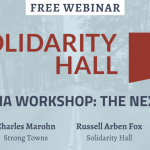Imagine designing a city for people rather than cars: Curitiba, Brazil
City of Dreams

John C. Médaille
John Médaille is a businessman in Irving, Texas, and also an Instructor in Theology at the University of Dallas, where he teaches a unique course on the Social Encyclicals for Business Students. He is the father of five, grandfather of two, and husband of one. He is the author of The Vocation of Business: Social Justice in the Marketplace and is finishing up another book, Equity and Equilibrium: The Political Economy of Distributism. John also blogs at The Distributist Review.
More to Consider
- Wendell Berry in the Big City
Mr. Wendell Berry of Kentucky will be in the Greater D.C. area this week, appearing at the Arlington Central Library Auditorium on Tuesday, May 4 at 7 p.m.…
- Wilfred McClay's "The Soul & the City"
Many of you will enjoy reading Wilfred McClay's fine article, "The Soul & the City," which was just posted on ANAMNESIS, A Journal for the Study of Tradition,…
-
The Next City: A Workshop
On Tuesday, May 5, at 1pm EST, Solidarity Hall and Strong Towns will present a live 90-minute Zoom video session, titled "The Next City," during which Strong Towns…



4 comments
Andrew Callaghan
http://www.citiesforpeople.net/cities/bogota.html
The Bogota project was inspired by what happened in Curitiba.
The episode about Bogota itself: http://www.hulu.com/watch/67737/design-e2-bogot%C3%A1-building-a-sustainable-city#s-p1-so-i0
The most inspiring part of the whole project is the concern for genuine human flourishing. They understand that people need organic community, space, and beauty in their lives. They also understand that government is capable of–and obligated to–increase the quality of life for everyone, especially the poor, but in a manner that is consistent with human dignity.
D.W. Sabin
Christopher Alexander has been largely ignored because he deals in the manifold details of craftsmanship , proportion and scale instead of the idolatry of modern “it” architecture. He demands hard slogging and this generation likes fireworks.
Albert
Very impressive city planning.
katy
Have you or anyone else at FPR read A Pattern Language by Christopher Alexander? After glancing through it (my husband is reading it now), I wondered why I haven’t heard more about Alexander, even in passing, from my agrarian/small is beautiful sources (online and print).
He suggests parking lots should be no more than 9% of a town. We live in one of those Midwest, formerly industrial cities that converted miles and miles of farmland into big box stores and even bigger parking lots. A few years ago there was flooding in an older (poorer) neighborhoods, 5 miles from the new developments. Blocks and blocks were condemned as uninhabitable. Apparently, in the rush to bring “business” to this city, and money to the pockets of our local developer (“Paving the Planet” used to be this developer’s slogan), they forgot to responsibly redirect the water flow.
Comments are closed.